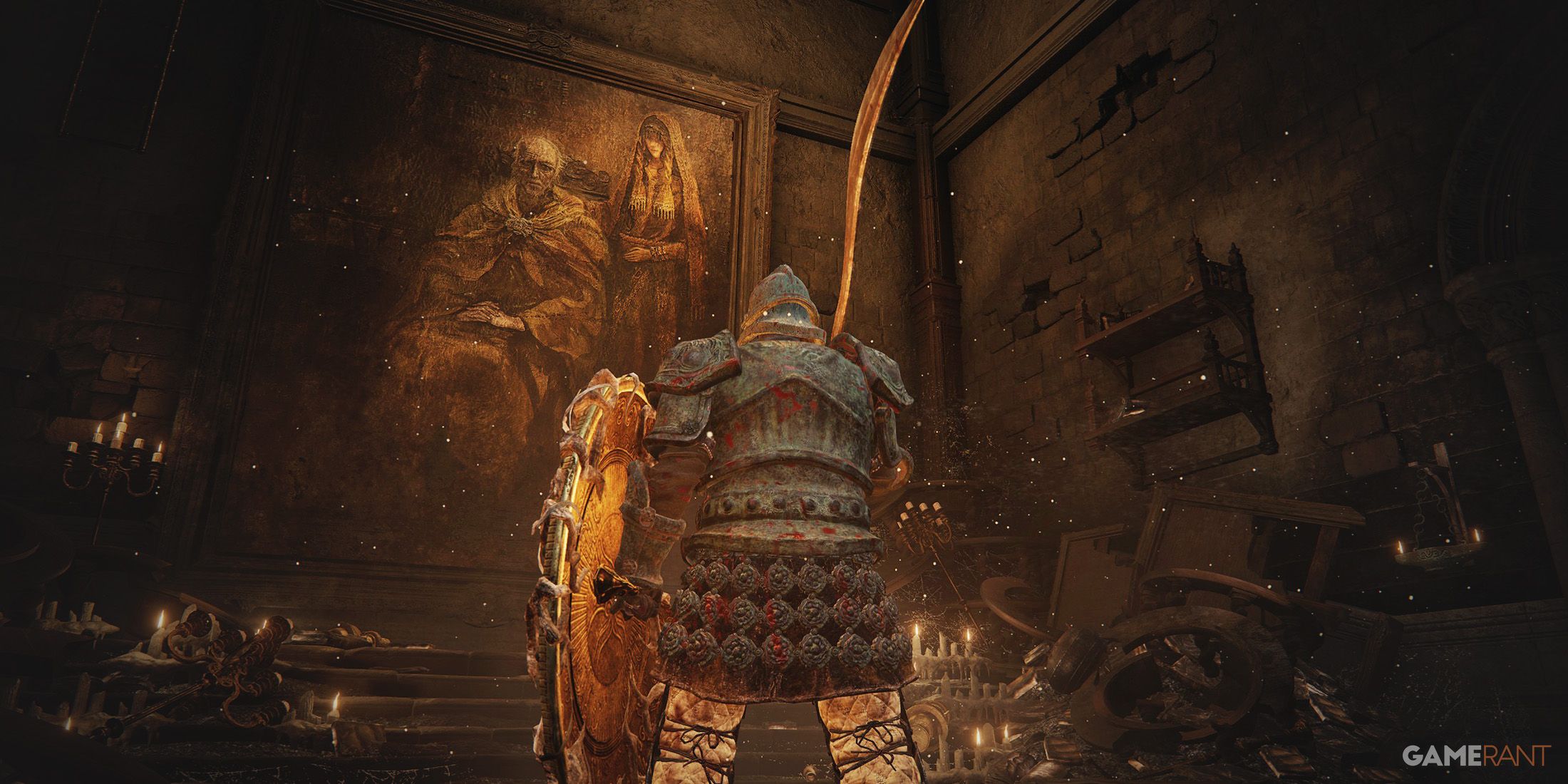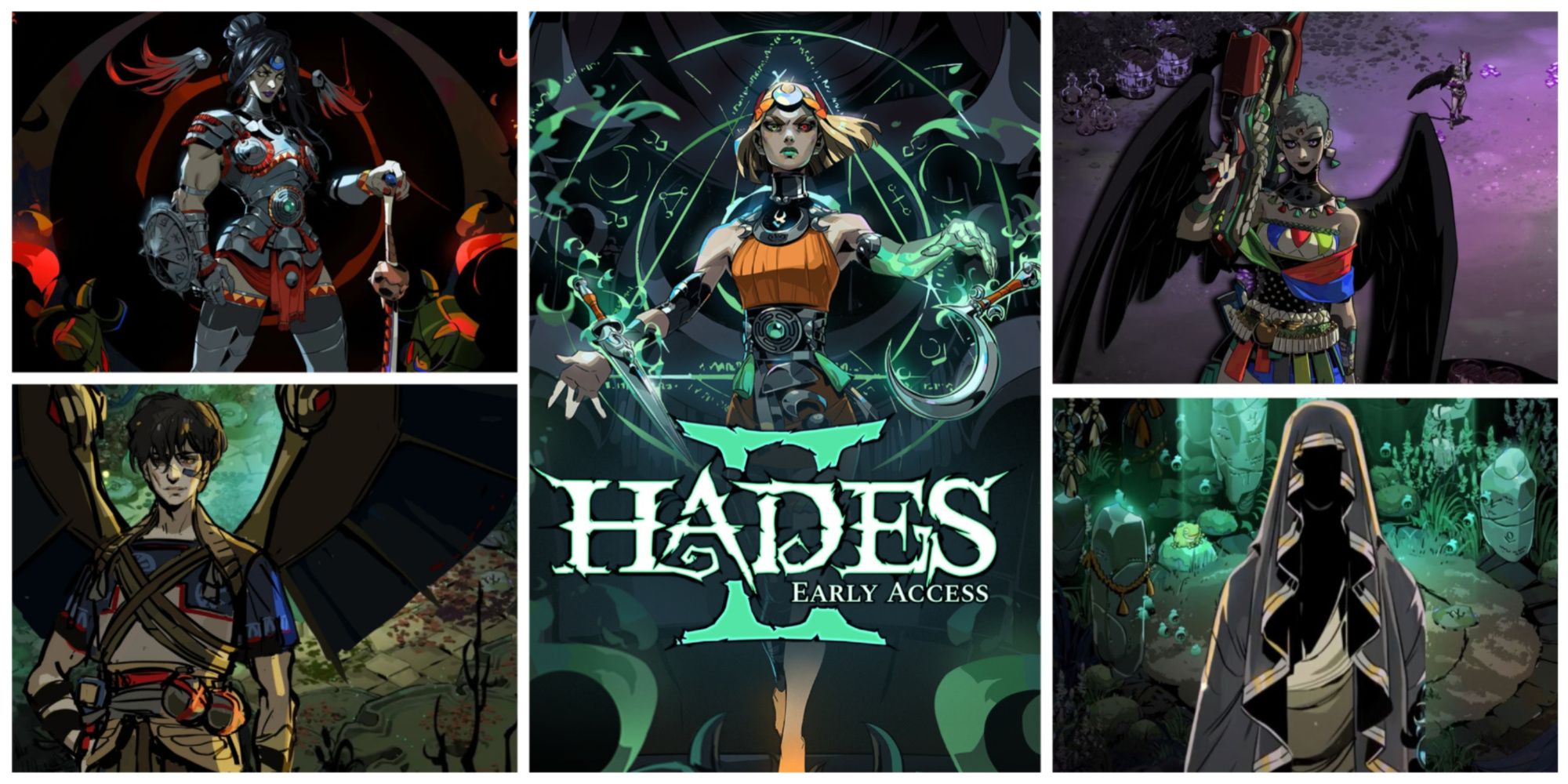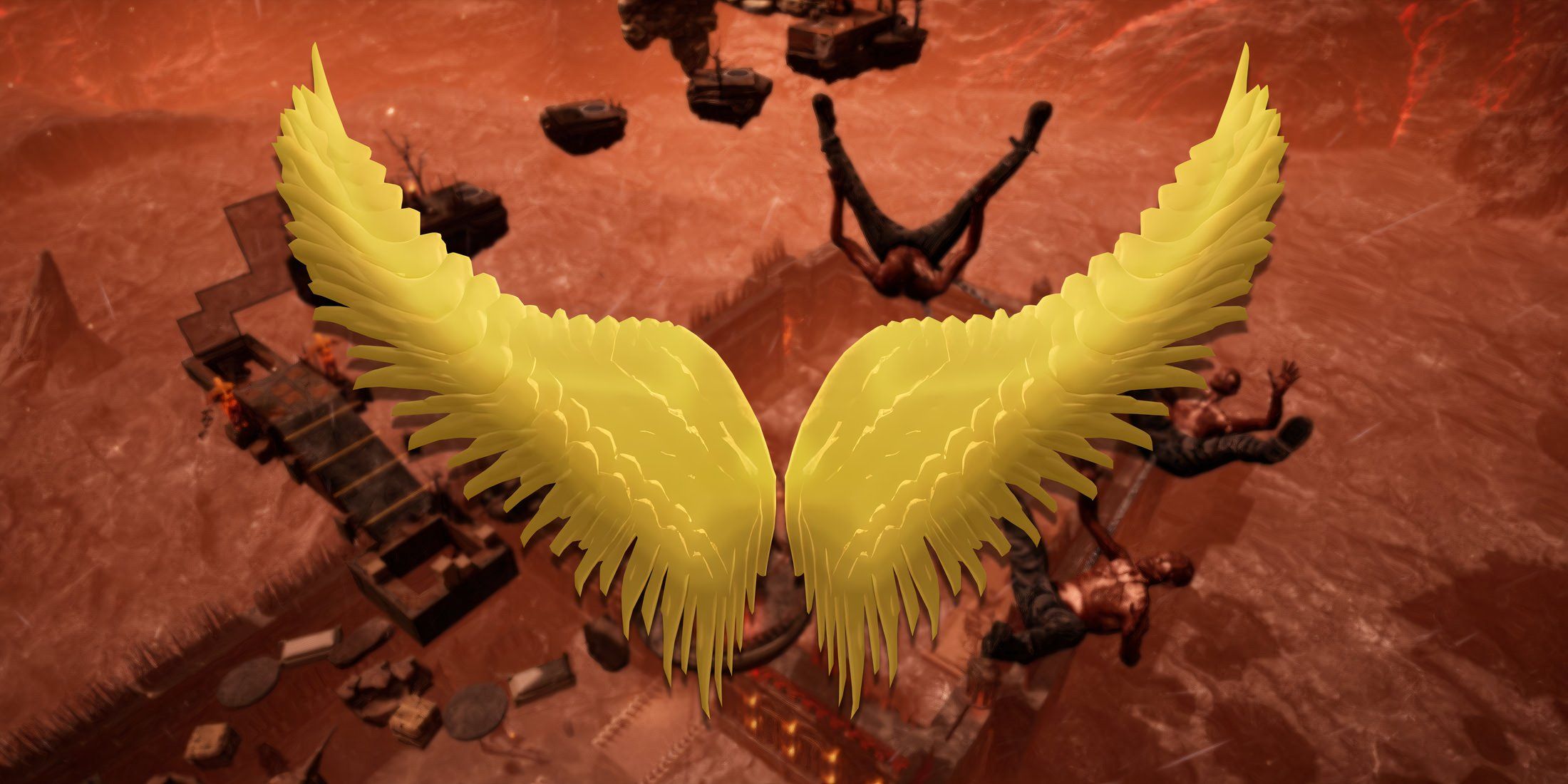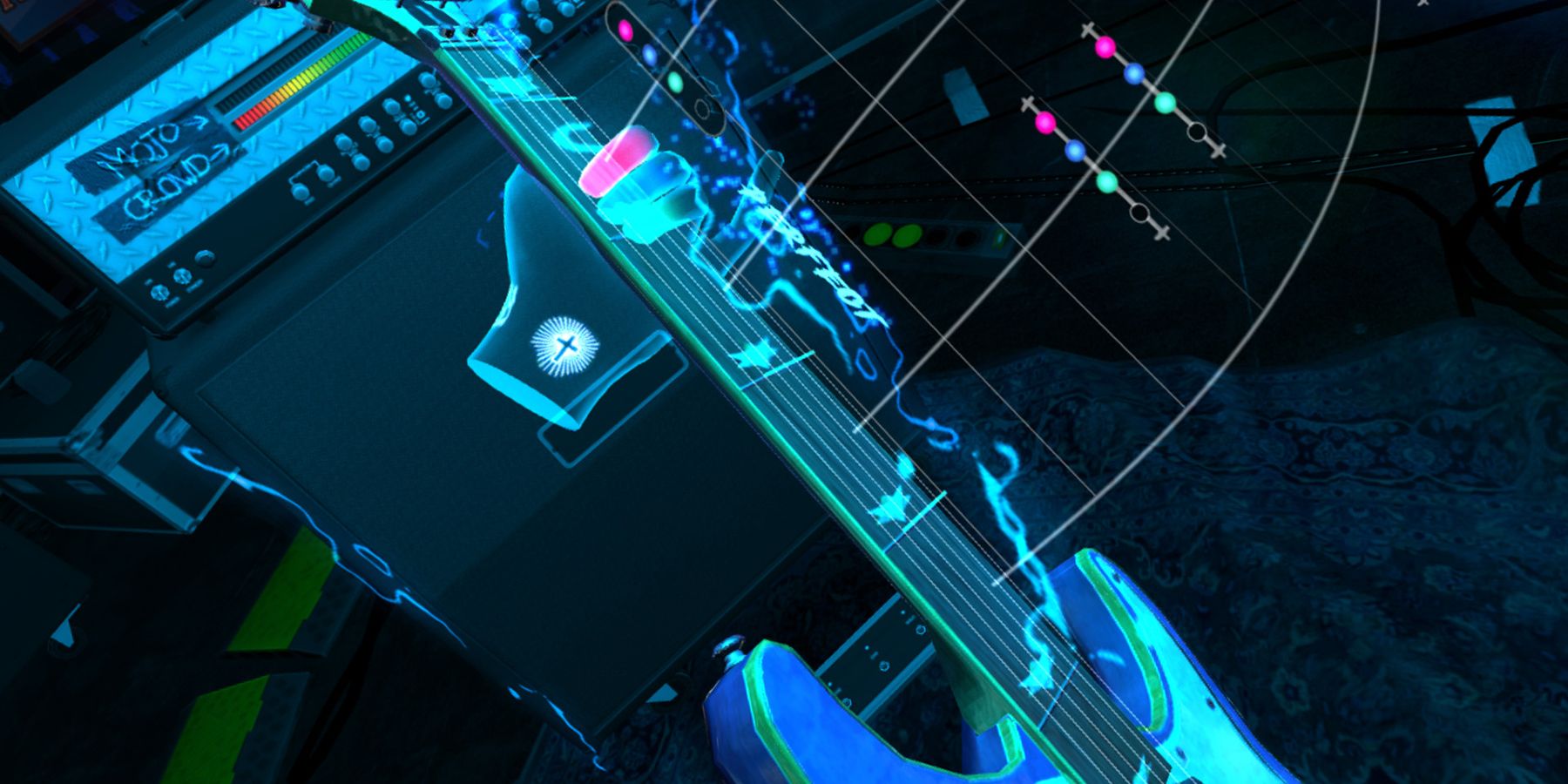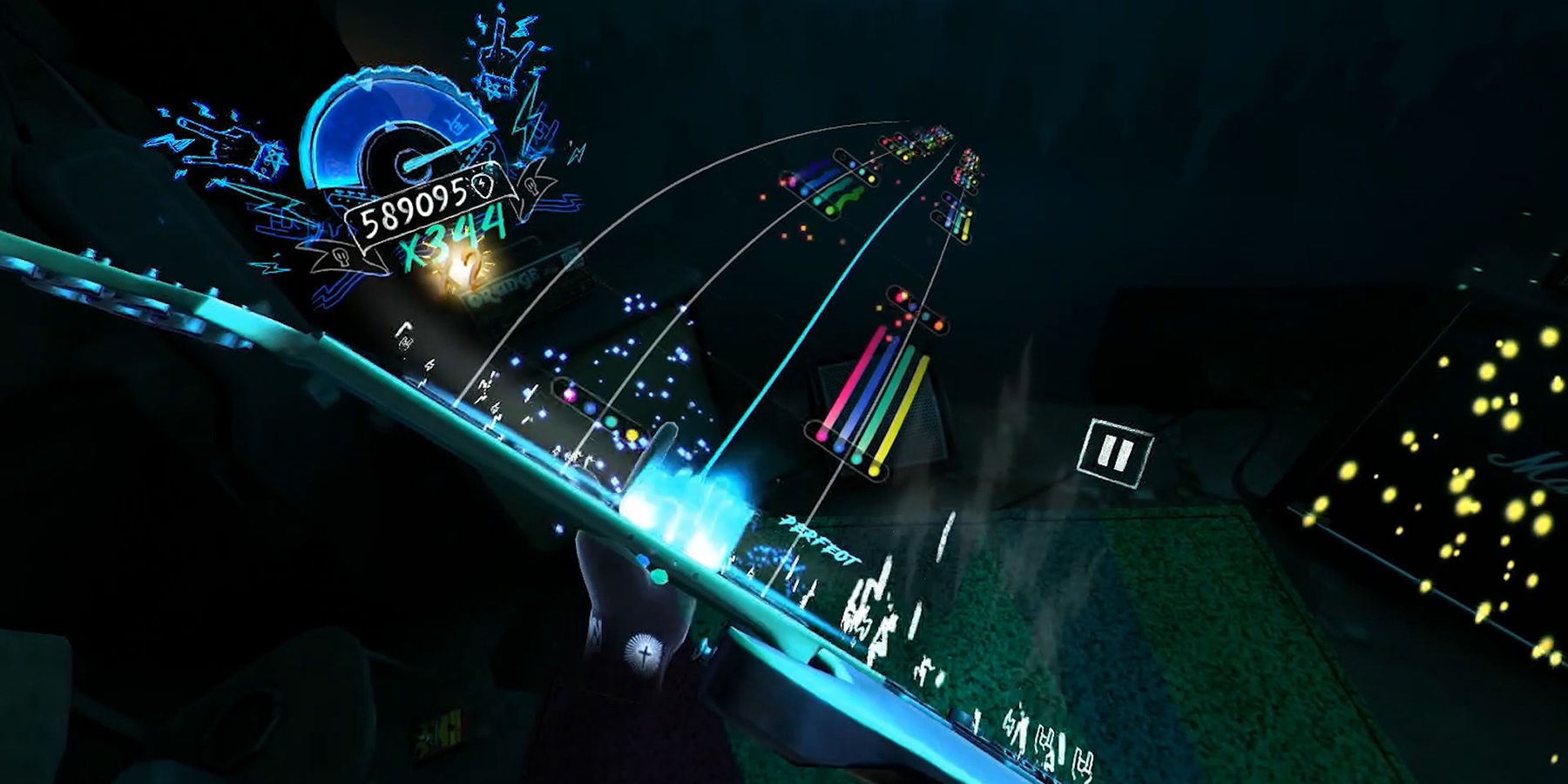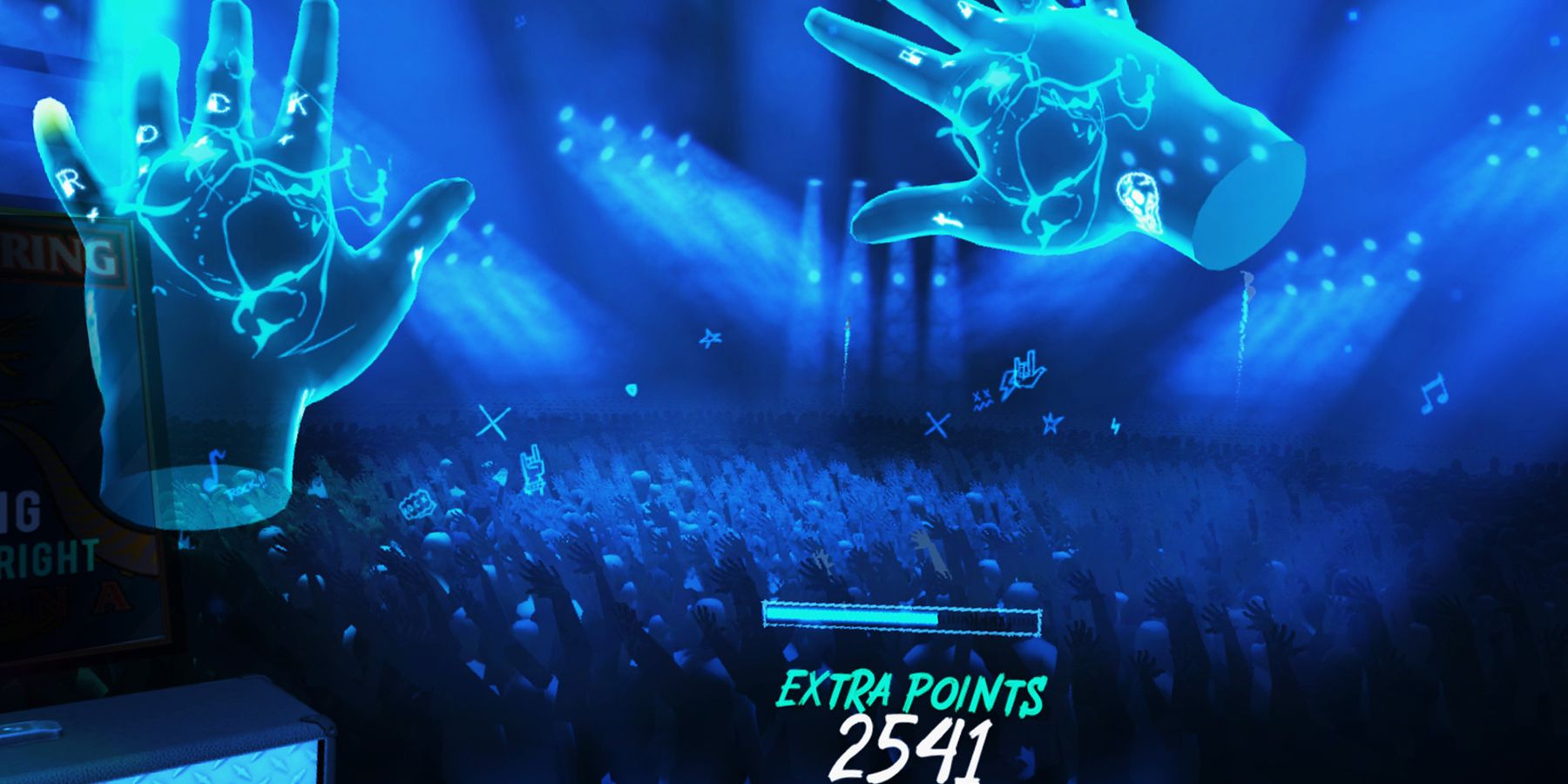After a long drought, a new band-sim rhythm game has arrived in VR. Developer Anotherway's Unplugged is an air guitar sim and the latest take on Guitar Hero's formula. Rather than relying on the now-iconic plastic guitar controller, Unplugged relies on finger tracking sim to allow players to tap into their inner rock god. The game has launched with 23 licensed tracks including artists ranging from Ozzy to The Offspring; a musical catalogue spanning over fifty years.
Game ZXC spoke with Unplugged's Marcus Henderson, one of the game's producers, and an industry veteran who has worked with both the Guitar Hero and Rock Band franchises. Interview has been edited for clarity and brevity.
Q: Can you introduce yourself and share your favorite track on Unplugged?
A: Absolutely! My name is Marcus Henderson. I’m one of the producers on Unplugged Air Guitar. I would say my current favorite track, just based on how we’re using the tech to make solos even more fun - just to distill that true air guitar vibe - is probably Flying High Again by Ozzy. It’s got that perfect kind of mid-level tempo, it honors one of my all-time favorite guitarists, Randy Rhoads, and in my opinion you can’t have a rhythm game without Ozzy.
Q: How would you describe Unplugged to gamers who have heard nothing about it?
A: So, what I’ve been going with is; it’s basically Air Guitar Hero. There’s a separation between the game mechanic of how you play Guitar Hero, Rock Band, and our game. We want people to really enjoy the experience performance; that physical, visceral feeling of waving your arms around, rocking out on stage. It’s a different animal, but we wanted it to be like an old shirt, or old sweater you’re putting on. We wanted it to feel familiar while taking things in a new direction, because you’re not holding a controller, or wearing gloves, or anything to play with. So, it’s really more about you having fun and playing the game, than it is about grinding for scores. And yeah, to distill that down to three words: Air Guitar Hero.
Q: Unplugged released on October 22. What kind of feedback did you receive leading up to launch?
A: Yes, the wait finally ended last Thursday! We are all beyond thrilled. We all put in so many hours. The team at Anotherway, whom I consider to be absolute geniuses. They’ve crafted something very, very special. There’s really nothing like this out there on VR right now, so we are very excited to get people’s reactions. And some of the user reactions and early pre-reviews have been really encouraging, and that feels great, but we just want people to enjoy it and have a good time, because that’s the essence of gaming, right?
Q: Apart from its finger tracking technology, does Unplugged feature any unique gameplay mechanics to mix up the rhythm action/band game formula?
A: Totally! Because we’re able to work with the hand tracking tech, you can move the guitar neck around to capture power ups. You can gesture toward and interact with the crowd. If you start to fail, the crowd will actually start throwing things at you. And that is analogous to real life, believe me! That has actually happened to me.
But if you do well, they will throw good things at you - that aren’t soda, popcorn or other things - and you can catch them for extra points. There is a dynamic fan sensibility about this game; the better you do, the more excited they get. So if you are doing really well, and the crowd is going nuts, and at the end of the song, you hit a certain score threshold, fans will throw their underwear at you in appreciation. Now, I don’t know if I want dirty underwear thrown at me? But if that is a sign of respect, I am more than willing to take it. And if you catch the underwear at the end of the song, that will increase your score.
You can also throw the horns up to energize and electrify the crowd a little bit, and see lightning bolts coming off your fingers. So, we were super creative in how you can use that physicality to our advantage, not only in terms of guitar mechanics, but scoring as well.
Q: Do you think Unplugged could help players learn how to play the guitar, or is the skillset more akin to mastering the plastic instruments of Guitar Hero and Rock Band?
A: So, I’ve had this discussion with a lot of guitar players. A lot of musicians have opinions about what Guitar Hero and Rock Band have done, to either help or hinder future musicians. And, you know, I’ve always been on the positive side of things.
I have always said, “Guitar Hero is not guitar playing.” So you have to create a distinction of what you are doing in a video game. There are not a lot of analogous threads between a video game real life. It’s not very often you will be in a position to kill a horde of zombies, right? And getting drafted by the NBA? The odds are pretty slim - I mean, at least for me, anyway.
But when you play a game, you can extract certain things and translate them back to real life skills. And I’ve talked to literally hundreds of kids who have played the game and are now actual musicians. And they have told me, “Hey man, this game not only made me fall in love with rock and music, but it also really helped me develop my rhythm, and my finger independence.” Those are valuable skills that are translatable to real life.
So, while we focused on the physicality and the chord-based elements of this, it still gives you that rhythmic sensibility. The game mechanic is still the same. You still need to be in lock with the rhythm, because at the end of the day, Unplugged is a rhythm game. So any time you are doing anything that allows you to pick up rhythm, or train your muscle memory to lock into a mechanic that is translatable, then that will surreptitiously seep into your musicality. And all of it is helpful.
Like I said, I’ve talked to a lot of people over the years, who have said that Guitar Hero is not real life, but some of those skills are useful. Unplugged is not the same game but you can extract some of the same benefits from it as well.
Q: Most gamers are comfortable with and accustomed to playing with controllers. Have players found it jarring to control a game without any material component?
A: It takes a little to get used to. You know, usually everybody that has played a rhythm game is used to holding some sort of peripheral. So when you grab the virtual guitar, you kind of default back to the spirit of why we created the game, which is to pay homage to the art of air guitar. When you play air guitar and put on a rock tune, or any type of music and instrument, you’re typically not holding anything in your hands. You’re just rocking out.
So it’s not unfamiliar, but once you realize this is what the game wants me to do, and I can put my hands in the correct position, it becomes really familiar. You distill that sensibility of playing air guitar, but you are also scoring and receiving feedback from the game. Once you realize “huh, I’m not holding a peripheral!” it’s kind of new and exciting. People are adapting pretty quickly.
The one thing people are saying is that it does take a minute to decide where you want the guitar to sit on you. Because you know, when you put a real guitar or bass on you, you have to adjust the straps to the proper length that works for you. Unplugged is no different. To move the guitar’s position up or down, you grab the whammy bar, and after that the guitar’s position is locked. You hit the song start button and you are off and shredding.
Q: VR titles like Beat Saber have seen tremendous longevity and popularity, in part due to custom maps. Are there any plans to release a map editor for Unplugged?
A: We’ve talked about pretty much any and all elements that will keep the community engaged and get people excited to keep playing by uploading their own tunes or crafting their own songs. While I can’t really elaborate too much on our plans for the future, I can tell you there really have been deep discussions about every element of gameplay, not just in terms of people passively consuming our game, but deep discussions about songcraft and development as well. If people are thinking it’s a possibility, chances are we’ve had conversations about them. Again, I can’t divulge too much, but we are excited about the things that we couldn’t fit into this game, and things we may be adding in the future.
Q: Unplugged’s Steam listing says that gamers will be able to experience five decades of famous rock. That’s an enormous slice of music and culture. How did you go about curating that soundtrack?
A: I think it came down to distilling the vibe of our game into finding music that works with how we’re utilizing techniques. We wanted to find music that people are familiar with, and may have been playing air guitar to for a long time. There’s a specific type of track that works well for our game that may not make the most compelling note chart in something like Guitar Hero, Rock Band, or another rhythm game. We really honed in on the value of our techniques, so that created a platform for selecting songs. Our game engine loves chords, so we selected chord-heavy songs. We didn’t want super-grind-athon masterpieces with million-note barrages. Again, enjoyment is what it’s all about. Accessibility is very important to us. We want people to jump around, have fun, and sort of remind themselves why they play air guitar in the first place.
So when we say five decades of rock, our game is really a love letter to rock and metal. It’s a tribute to the electric guitar. So, we hand selected a little bit from each decade that we feel represented our vibe and game mechanics to the point that it’s a no-brainer. When you see the full setlist, you’ll go “that makes sense” in context of what air guitar is all about. It was a little easier once we realized how we want to enhance and cross reference back to how our game works, and we think we picked some of the best songs for any rhythm game ever, specifically where air guitar is concerned. These are air guitar songs.
Q: Most rhythm action and band games seem to favor fast, up-tempo music. Are there elements of songs that Unplugged’s mechanics capture more effectively than other rhythm games?
A: Once we were done playtesting what we thought was going to be the gold standard of an Unplugged song, we realized that there many slower songs were better for what we were trying to do. You see a lot of pro rhythm game players, and they’re almost like statues. They’re barely moving because they don’t want to miss a note. It’s all very serious and super technical. And there are definitely elements of that in our game, but we really wanted to emphasize the fun, and looseness, and spirit of rock and roll. We want players to jump around, dance, and explore the environment.
Because we are essentially a first-person stage simulator, you are able to soak in some of the other elements aside from the note highway. These stages are beautifully crafted. The starting stages, as you work up to the larger venues, really feel like small clubs. They have that vibe. Your amp is right next to you. Maybe the crowd is further away, because they are apprehensive about new talent. We really wanted to step back from a million notes coming at you, and let the player absorb the experience, and distill that feeling of being on stage.
When you see your amp, you can see that it is turned on, and cabled correctly. All these things were really well thought out and finely crafted. You have a selection of real-life guitars to choose from. It’s a multi component experience. There’s the gameplay which is super fun, but there’s a cultural representation where we are able to immerse people what it’s like to be an actual musician. There’s a backstage area, you earn fans, you unlock more guitars - and there will be more amps and guitars to come - but all these aspects of being a successful musician. Because that entails more than just staring at your instrument. You have to interact with the crowd and enjoy your environment.
Q: How many tracks will Unplugged include at launch?
A: We are at 23 right now. There’s a good selection of rock, metal, punk, alternative... We are super thrilled. You can think about how songs are tiered in rhythm games; typically starting with easier songs that are a little less impactful, and different difficulties to sort through. You can earn gold and diamond records through your performances. And as you progress you unlock larger venues where your more difficult performances will generally be.
There’s something for everyone in our game. If you want to pursue the leaderboards, you’re a scoring guy, a hardcore rhythm player who wants to show everybody what you are all about, we’ve got you covered. If you are a more casual gamer who just likes to put on the headset because you love rock and roll? This is what we made it for. There are a ton of concepts to discover across all our difficulty levels.
Q: Can you tell us about the different venues in the game? Are they based on real places or works of fiction?
A: Right now, we created spirited homages to a collection of smaller clubs. Kind of like Guitar Hero these are fictional clubs you’re gonna get into. We’ve discussed making real life venues, but we wanted to capture the fantasy element of the rock world, because everybody knows rock is larger than life.
If you’ve ever been to a small club to see a local band, these clubs will look, feel, and even smell, authentic to you. As you get up to the larger venues, we go into full suspension of disbelief, and it is a total fantasy realm. You are not in a small club anymore; you are in another world altogether. And that’s what people want. You go to these experiences to find something you’re not going to experience in real life.
Q: What was it like collaborating with the rock icons whose music is featured in game? Do you have any stories to share?
A: Everybody knows that Satchel from Steel Panther is doing the tutorial for the game. Of all the games I ever worked on, it probably came out as the funniest piece of video game content I have ever produced.
Satchel is not only an amazing dude and a hilarious human being; he’s a crazy killer performer. Like I said, rock and roll is larger than life, so we wanted a larger than life personality. Watching Russ [Parrish] turn into Satchel, and then kill the tutorial? It was just amazing. Working with Steel Panther has been incredible. The guys are phenomenal musicians. And if they weren’t playing music, they would be stand-up comedians.
The player starts the game by tapping a poster, and Satchel starts the tutorial by breaking the fourth wall. As you go on, he will provide you with motivational—and sometimes hilariously de-motivational—epithets that just make the game that much sweeter. And we are looking forward to more things to come. Can’t share too much, but there is much more hilarity to ensue.
Q: Tell us more about the finger tracking technology Unplugged uses. What challenges did you face during its development?
A: We realized pretty early on that we needed to do some workarounds based on the limitations of the tech at this time. It’s still a fairly new technology, from the Quest 1 to the Quest 2. We’re in the early days of the vast potential of what these headsets and the tracking technology can offer. So, we went to the bleeding edge of how we’re going to utilize this tech to power our game.
We realized early on, certain things weren’t going to translate well, and we wanted to preserve the performance aspect of the game. The more you are focused on individual fingering, the less interested you are going to be in moving around and immersing yourself in your environment. We knew things like chords were going to work great for our game. And the work-around for distilling really super-fast sixteenth notes or whatever was sort of brilliant.
We created Virtuoso Mode. When you see a super-fast passage or “high way” that the hand tracking tech can’t always keep up with, it just becomes a free for all. Go crazy. Move your hands, wiggle your fingers, and your score will just explode. And that’s a really cool solution for hitting the wall on this tech. Future iterations will be able to track a little bit faster. It’s getting better all the time. For now, it was just about making sure we can keep people excited with failing off because a million notes come at you. It’s been a challenge, but a really fun challenge to pass.
Q: Do you think this technology could be applied to other games? Or other instruments?
A: Oh absolutely. The game engine that we created has unlimited potential, and it’s getting better all the time. As the capabilities of the hardware increase, we’re gonna continue pushing it to see if it can translate to other instruments or other experiences that really preserve that vibe and experience we try to capture with Unplugged.
If you’re thinking that it may translate, we’ve been thinking that there is unlimited potential for translating the core tech to other elements of that culture. [laughing] Did you see how I danced around that answer? I can’t tell you too much, but oh boy howdy, have we had discussions and we’re super excited. We really hope we strike a chord—pun intended—with people, so we are granted the ability to continue working on this.
We want to offer players who love rhythm games an unlimited fun experience that leverages all the potential that revolves around this tech. We just love music. We love guitar. We love musicians, and we love musical instruments. So it’s a natural translation to begin the exploration process of how far we can take this.
Q: Licensing classic music can be a major challenge. As a developer, how do you get that ball rolling, and how complicated was the process?
A: It’s like any other rhythm game. You reach out. Sergio, who works with us on our publishing team, was able to procure everything on our wish list. So shout out to Sergio Pimentel for making this happen! He really knocked it out of the park. We were only given a couple of noes, and they weren’t even hard passes. More just, “Hey, we’re a super big band, and we’re gonna sit this one out and see how you guys do before we commit to future iterations.”
That’s no different than anything I experienced working on Rock Band. In Guitar Hero, back in 2005, we got a lot of hard noes. Nobody knew who we were, or what our game was. But by Guitar Hero 2, record labels were throwing their entire catalogues at us. And when Guitar Hero 3 came around, we had already made our mark on the industry, so securing songs was actually very easy.
We were really lucky with this one. Everybody said yes, and we even got a couple of huge bands to do some special things for us, which was amazing. So, we are beyond excited.
Q: 2020 was a tumultuous year for everyone. Did it affect the development of Unplugged?
A: Not really! That’s the crazy thing, this is a truly international and global effort. Our developer, Anotherway is based out of Spain. Vertigo is based out of Rotterdam. I work in Silicon Valley. And we all came together through the power of constant communication and sending a million emails and a thousand meetings.
The distance never hindered us. The inability to meet in person never hindered us. It made it a little more challenging to get messages across, because if I send an email, they’re nine hours ahead. But we saw that as an opportunity to kind of work twenty-four-seven, and that kind of accelerated the development process. I would send over concepts, or design elements, or things that might work to Anotherway, and Anotherway would meet up with our executive producer, Martin [Janse], who did just a phenomenal job of managing all this, and getting everything past QA.
There is so much talent in Vertigo and Anotherway. We kind of assembled the Borg hivemind, and we were so lucky that everyone was on the same page. Even if we were working remotely, or if we had considerable physical distance between us, it never stopped us from collaborating creatively to get what we needed to get done.
Q: What was the single greatest challenge you faced?
A: You know, we’ve been so, so lucky to find work arounds, and game design elements that allowed us to turn negatives into positives. And I would say a lot of that came from Julia [Casal] and Ricardo [Acosta] at Anotherway. I hold those two in extremely high regard. There was never anything they couldn’t overcome. They are both so cool, and so creative. Whenever we maxed out the cap, or spazzed out the engine, they would always have something in their back pocket. And it was always like “Oh my god! That’s actually cooler than what we had planned!”
I think that’s part of our attitude as well. Everybody on this team—and there are literally dozens, and dozens, and dozens of us working on this game—everybody had that “what if…?” energy. What if we did this? What if that happened? We were collectively, unabashedly optimistic about everything. And when you have an attitude like that, it challenges the entire team to find ways to make something that is really, really rad. You only get that with super cool, ultra-creative humans who are excited about the IP they are working on. And it really shows in the game.
Q: If you could automatically include songs from any artist, living or dead, in Unplugged, who would be your headliner?
A: I’m gonna go with Jimi Hendrix on this one. Because Jimi is… well, he’s sort of the golden god of electric guitar. The icon of icons. And when people rock out to air guitar. Again, chances of me playing the guitar like Jimi Hendrix in real life? Zero percent. Chances of feeling like Jimi Hendrix when you play air guitar? A billion percent! So yeah, if Jimi could come down and kiss us from the Purple Haze in the sky, to join us on this journey? He would be my number one selection of who I think would be the ultimate representative. Who knows? We’ll see what the future holds!
Q: What is next for Anotherway and Unplugged? Are there any plans for song packs or other DLC?
A: I think everybody is gonna take a couple days, like everybody does after a long development process with incredible hours. Anotherway has been burning the midnight candle, so to speak, on this game for a long, long time. So, I would recommend everybody rest up, do their post-launch chill, and feel good about what we’ve done.
We really, really hope that people love the game that we loved to make. And if we are honored and granted the ability to continue forward, the plan is to enrich the game experience with DLC packs. Potentially including themed DLC packs, which are curated either for specific holidays or to fit a specific event, along with more power-ups, more unlockables, and more enhancements to make the game even more fun.
We want people to play our game forever. And in order to do that, we have to earn their love and continue putting out really compelling content. That’s the challenge for any game development company, and I think we are up for it. So, let’s do this together. This game is not only a love letter to music and musicians, but to the fans. We tailored the experience for you. If you’re reading this, we did this for you. We really did. So, if you join us on this journey and you like what we did, we can carry this forward and hopefully create more magic in the future to come.
Q: Is there anything else you would like our readers to know?
A: Thank you for following us all this time. I’ve said it before and I’ll say it again: I was incredibly fortunate to be a part of these incredible teams. I’ve worked on a bunch of rhythm games, and the sales metric isn’t necessarily the end game. We want people to take the headset off and feel invigorated and fall in love with rock, and the art of guitar all over again. We are so grateful for you giving us a chance to show you what we’ve done, and we can’t wait for you to get on stage with us and rock out. Because this is a true labor of love for us, and we did this for you. So we hope you like it! Now it belongs to everybody. It was us; we created a piece of work we all believe in and love, and now it belongs to the players.
[END]
Unplugged is available now for PC.

